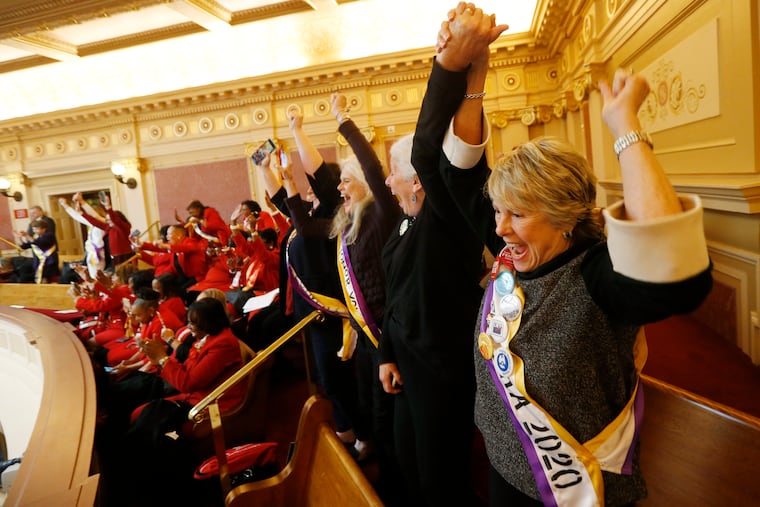Three state AGs file lawsuit demanding addition of Equal Rights Amendment to Constitution
The attorneys general for the last three states to ratify the Equal Rights Amendment filed a lawsuit in federal court on Thursday arguing that the Trump administration must add the amendment to the U.S. Constitution.

The attorneys general for the last three states to ratify the Equal Rights Amendment filed a lawsuit in federal court on Thursday arguing that the Trump administration must add the amendment to the U.S. Constitution.
Virginia's General Assembly, newly controlled by Democrats in both chambers, on Monday became the 38th state to ratify the amendment, meeting the requirement of approval by three-quarters of the states. Opponents say the vote was meaningless, because the congressionally imposed deadline for ratification expired decades ago.
The lawsuit will likely become the vehicle for deciding that question, said Virginia Attorney General Mark Herring, who brought the suit along with Illinois Attorney General Kwame Raoul and Nevada Attorney General Aaron Ford. Two other federal lawsuits on the matter are also pending.
The latest suit, assigned to U.S. District Judge Rudolph Contreras, contradicts a Justice Department memo earlier this month that said the national archivist, who certifies the ratification of amendments, should not do so for the ERA, citing the 1982 deadline. The archivist has said he will follow the DOJ advice unless a final federal court decision overrides it.
"This could be a historical case for future amendments, not that they come along that often," said Carl Tobias, a constitutional scholar at the University of Richmond Law School. "I can't imagine it wouldn't go to the Supreme Court."
Nevada ratified the ERA in 2017 and Illinois followed in 2018. The amendment guarantees legal protections on the basis of sex and was first approved by Congress in 1972.
Proponents of the amendment have dismissed the ratification deadline as irrelevant because it's not a constitutional requirement, even though opponents argue the Supreme Court has upheld ratification deadlines in the case of Coleman v. Miller in 1939 and Dillon v. Gloss in 1921.
"The work is done, every constitutional requirement has been fulfilled, and the ERA is now the 28th amendment to the Constitution," Herring, a Democrat, said at a news conference announcing the lawsuit, which was filed in U.S. District Court in Washington, D.C.,
He said "the Trump adminstration has conconcted a scheme to try to nullify the will of millions of Americans," noting that the passage of the 27th Amendment - which addresses the pay for members of Congress - took more than 200 years (that amendment did not have a deadline).
Douglas Johnson, the senior policy advisor for National Right to Life, which opposes the ERA, accused Herring of "political preening," and ignoring the Supreme Court rulings on the 1939 and 1921 cases.
"When this [lawsuit] gets before a panel on the Court of Appeals, this is going to pop like a soap bubble," Johnson said.
Opponents of the ERA also say its ratification is invalid because over the years, five states - Idaho, Kentucky, Nebraska, Tennessee and South Dakota - have rescinded their ratifications.
But Herring called those actions"purported recissions," saying that the Constititution does not give governments the power to rescind such votes. During ratification of the 14th Amendment, which guarantees "equal protection of the laws," Ohio and New Jersey attempted to "pull back" their ratifications but they not were allowed to do so.
The archivist's decision to follow the DOJ advice, unless a final federal court decision is issued, "underscores the need for the courts to put this to rest," Herring said.
Raoul called the archivist's role "ministerial and clerical," and said the archivist does not have the discretion to fail to certify the amendment.
"We now have this historic opportunity to ensure that equal rights, regardless of sex, are properly recognized as part of the Constitution," said Herring, a Democrat who has said he is interested in running for governor. "Virginians have made it clear that it is their will that the ERA be ratified, and I now have the great honor of continuing that fight."
Carol Jenkins, chief executive of the ERA Coalition, said that despite decades of laws that improve women's legal status, 80 percent of the poor are women, pay equity and workplace promotions still favor men, and women assaulted at home or in the workplace have no recourse to the federal courts. Her organization's polling says 90 percent of Americans and 94 percent of millennials support the ERA.
"Its cultural impact is being seen in this country already," she said, pointing to corporate statements of equal pay and promotion policies.
A lawsuit opposing ratification was filed in Alabama last year by the attorneys general of Alabama, Louisiana, and South Dakota. Another lawsuit supports ratification and was filed in Massachusetts by Equal Means Equal, the Yellow Roses and Katherine Weitbrecht. Several bills are also pending in Congress to address the earlier deadlines.
The Alabama lawsuit seeks to bar the National Archives and Records Administration from certifying the vote, and led to the DOJ letter.
The Massachusetts lawsuit argues that neither Congress nor the executive branch have power to set a deadline for passage of a constitutional amendment and seeks the court to order the national archivist to properly record the ratification and bar the archivist from accepting the five state rescissions and other remedies.
Tobias, the University of Richmond professor, said there are multiple ways the lawsuit could go forward.
"A federal judge may combine the cases," he mused. "The D.C. Circuit might be more favorably inclined, given their general jurisprudence, but the Supreme Court is fairly conservative - but who knows what conservative means in this case?
“And win or not, it could go back to Congress and start all over.”